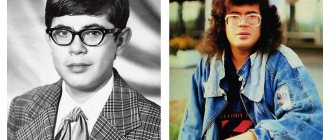Vladimir Vysotsky - Soviet poet, theater and film actor, songwriter (bard). He is the author of more than 600 songs on a variety of topics.
In addition to his brilliant songs, thanks to which he became famous throughout the world, he managed to play many iconic roles in theater and cinema. According to recent polls, Vysotsky took 2nd place in the list of “Russian idols of the 20th century,” second only to Gagarin.
We bring to your attention the biography of Vysotsky. Of course, this biography, like the vast majority of biographies of great people, contains many paradoxes. But first things first.
So, here is a short biography of Vladimir Vysotsky. Read interesting facts about him here.
Brief biography of Vysotsky
Vladimir Semenovich Vysotsky was born on January 25, 1938 in Moscow. He lived in a large communal apartment with his parents. His father, Semyon Vladimirovich, was an actor and bard, and his mother, Nina Maksimovna, worked as a translator and assistant.
Childhood and youth
When the Great Patriotic War began, little Volodya was only 4 years old. In 1947, the parents of the future artist decided to divorce.
When Vysotsky was 9 years old, he lived in occupied Germany. Despite various life difficulties, the boy regularly studied piano.
After his mother remarried, Vladimir faced an unexpected problem. He could not find a common language with his stepfather because he abused alcohol and often caused scandals.
In 1949, Vysotsky returned to Moscow and lived with his father and his new wife. During this period, the young man begins to take an active interest in music and master the first guitar chords.
A popular trend at that time were camp-themed songs, which Vysotsky performed with pleasure in various companies.
At the age of ten, he became interested in theater, as a result of which he began attending a drama club. This hobby played an important role in his biography.
12-year-old Vladimir Vysotsky
After graduating from school, Vladimir entered the Moscow Civil Engineering Institute. V.V. Kuibyshev, however, dropped out of school after six months, due to a complete lack of interest in this field of activity.
Feeling a craving for theatrical art, Vysotsky entered the Moscow Art Theater. There he manages to demonstrate his acting talent. While studying in his 4th year, he first appeared on the stage of a student theater.
After this, Vysotsky played a cameo role in the film “Peers”. From now on, his biography will be connected with the theater until his death.
Special features of Vladimir Vysotsky
Theater
After studying at the Moscow Art Theater, Vladimir Semenovich works at the theater. Pushkin and the Theater of Miniatures. Due to the fact that he was not trusted with any serious roles, he had no desire to continue working there.
Soon Vysotsky found himself in the famous Sovremennik, but even there his talent remained in the shadows.
However, when he became an actor at the Taganka Theater, he finally managed to fully reveal his acting skills. He was trusted to play the roles of Hamlet, Galileo, Pugachev and many other famous heroes.
Together with the Taganka Theater troupe, he traveled to a huge number of cities in Russia and abroad.
Vysotsky's last poem
There is ice both below and above. I'm tossing between. Should I punch through the top or drill through the bottom? Of course, surface and not lose hope, and then get down to business, waiting for visas. The ice is above me, break and crack! I'm covered in sweat, like a plowman from a plow. I will return to you, like ships from a song, Remembering everything, even old poems. I am less than half a century old - more than forty. I am alive, for twelve years you and the Lord will keep you. I have something to sing when I appear before the Almighty, I have something to justify myself to him. 1980
Versions:
…………… The ice is above me, break and crack! I am pure and simple, even though I am not from the plow, I will return to you, like ships from a song, Remembering everything, even old poems. ……………
Note:
It is considered the last poem by V.S. Vysotsky. Addressed to Marina Vladi. These lines were handwritten on a Viazur travel agency business card measuring 13.4 by 10 centimeters. The date on the cardboard is June 11, 1980.
Vladimir Semenovich Vysotsky died
On July 25, 1980, between 3:00 and 4:30, his heart stopped “due to a heart attack.”
At about two o'clock in the morning, doctor A. Fedotov gave him an injection of sleeping pills and Vysotsky finally fell asleep, sitting on a small ottoman in a large room.
A. Fedotov recalls: “I was home from my shift - tired, exhausted. I lay down and fell asleep - probably around three o'clock.
I woke up from some kind of ominous silence - as if someone had pulled me. And to Volodya! The pupils are dilated, there is no reaction to light. Let me breathe, but my lips are already cold. Late.
Between three and half past five, cardiac arrest occurred due to a heart attack. Judging by the clinic, there was an acute myocardial infarction. And when exactly the heart stopped is difficult to say. Razzakov Fedor Ibatovich
Dossier on the stars.
1962-1980. - M.: ZAO Publishing House EKSMO-Press, 1999, p. 317. On January 25, 2012, Google released a logo for the 74th anniversary of the birth of Vladimir Semenovich.
Vysotsky's creativity
Vysotsky wrote all the lyrics and music for his famous songs himself. He began to get interested in poetry while still a schoolboy. Subsequently, this hobby will become the main one in his biography. It is no coincidence that he is called the Pushkin of the 20th century.
16-year-old Vysotsky
According to the artist, his first song was “Tattoo”, performed by him in 1961. He considered his idol the then famous musician and actor Bulat Okudzhava.
Vysotsky began writing songs more seriously in the 60s. But at first his work was not appreciated. Listeners were little attracted to the yard theme, and in such an unusual execution.
It must be said that at that time the musician himself did not take his compositions seriously, saying that he wrote simply for his friends and “home gatherings.”
Vysotsky experimented with different genres, trying to talk about serious things in simple words. In 1965, he wrote the famous song “Submarine,” which was instantly loved by the public.
From that moment on, Vladimir Vysotsky repeatedly wrote songs for films, and also took part in the filming himself.
In 1968, his debut album was recorded with his songs heard in the film “Vertical”. The composition “Song about a Friend” immediately gained incredible popularity in society.
In 1975, the bard recorded the gramophone record “V. Vysotsky. Self-portrait." This album is notable for the fact that each song was accompanied by comments from the author.
In 1978, an important event occurred in Vysotsky’s biography: he was awarded the highest category of pop vocalist. Thus, the Soviet Ministry of Culture officially recognized the artist’s work.
The popularity of Vysotsky's songs grew every day. His poems and manner of performance so impressed foreign listeners that they massively bought pirated recordings of the artist.
In 1979, Vladimir Semenovich was invited to perform in New York and Toronto. At the same time, he took part in the creation of the famous almanac "Metropol", which was not influenced by censorship.
It was released in 12 copies, one of which was illegally exported to the United States and officially published there.
Vysotsky did not stop giving concerts in large and provincial cities. Once on tour in France, he met a gypsy musician, with whom he recorded many compositions.
Despite the fact that in recent years Vysotsky had serious health problems, he did not stop performing in front of the public, while also playing in the theater.
He wrote more than 600 songs and about 200 poems. Wherever the musician appeared, stunning success and love from the public awaited him. Concert halls were always crowded, because everyone wanted to hear Vysotsky’s hysterical, hoarse cry: “Save our souls.”
During the period of his creative biography, he recorded 7 of his own albums and 11 collections of other people's songs performed by him. However, the exact number of his albums is not known for certain.
The fact is that they were published in different countries, were often not allowed for sale, and were also rewritten many times.
[edit] Creative path
On March 8, 1953, as a student in the 8th grade, he wrote the poem “My Oath,” dedicated to the memory of Stalin, and in which he expressed his feelings of grief for the recently deceased leader.
From 1956 to 1960, he was a student in the acting department of the Moscow Art Theater School.
In 1959, Vysotsky’s first theatrical work was the role of Porfiry Petrovich in the educational play “Crime and Punishment”, and his first film role was in the film “Peers” - the episodic role of student Petya.
In 1960-1964 he worked (with interruptions) at the Moscow Drama Theater named after A. S. Pushkin.
In the early 1960s, Vysotsky's first songs appeared. The song “Tattoo”, written in the summer of 1961 in Leningrad, is considered by many to be the first. But there is a song “49 days”, dating from 1960, about the feat of four Soviet soldiers who drifted and survived in the Pacific Ocean.
After working for less than 2 months at the Moscow Theater of Miniatures, he unsuccessfully tried to enter the Sovremennik Theater.
In 1964 he created his first songs for films.
From 1964 to 1980 he was an actor at the Taganka Drama and Comedy Theater in Moscow. On November 29, 1971, the premiere of the play “Hamlet” based on Shakespeare’s tragedy of the same name took place at the Taganka Theater (directed by Yu. P. Lyubimov), in which Vysotsky played the main role.
On February 13, 1978, Vysotsky was awarded the highest category of pop vocalist, which was the official recognition of Vysotsky as a “professional singer.”
In total, the artist gave about 1.5 thousand concerts in the Soviet Union and abroad.
He composed over 200 poems, about 600 songs and a poem for children (in two parts); in total, Vysotsky owns more than 850 poetic works.
During Vysotsky’s lifetime, 7 minions were released (released from 1968 to 1975). Each record contained no more than 4 songs.
He starred in almost 30 films.
Irina N. Zorina o[2].
Life in cinema
Vysotsky played his first acting role in the film “Peers”. This was followed by more serious films: “The Career of Dima Gorin” and “The 713th Requests Landing.” However, directors still did not trust him with leading roles.
Perhaps this was due to the fact that Vysotsky began to abuse alcohol. Subsequently, alcohol became the cause of many problems in his personal and creative biography.
The film “Vertical” brought national love and recognition to Vladimir Semenovich, for which he wrote all the musical compositions. The day after the film was released, Vysotsky became the favorite actor and musician of many Soviet citizens.
Once upon a time, in his distant childhood, young Volodya performed compositions by popular authors on the guitar, and now in every courtyard group young people vied with each other to sing his own songs.
Vysotsky really liked cinema, so, despite the colossal workload in the theater and constant bard concerts, he continued to act in films with famous directors.
He managed to play in such popular films as “Two Comrades Served,” “Master of the Taiga,” “Brief Encounters,” etc.
Despite the recognition of the public, Vysotsky was in serious confrontation with the authorities of the USSR. The Communist Party constantly put a spoke in the musician’s wheels, doing everything possible to prevent the spread of his songs.
To be fair, it should be noted that with all this, many heads of government agencies openly sympathized with Vysotsky, helping to resolve certain problems.
Due to the constant incredible workload, Vladimir Vysotsky began to drink seriously, which is why he was repeatedly kicked out of his native Taganka theater.
However, then he was again offered the main roles, which he performed brilliantly on stage. It was at this time that he played Hamlet, which became his calling card.
No matter what problems the bard faced in life, he never faked it, but completely devoted himself to what he loved.
For the first time on television he was shown in the Estonian program “The Guy from Taganka”, where viewers could learn in more detail about the life of their idol. Then he appeared on French television, where he performed original songs and answered questions from the audience.
Despite the enormous interest in Vysotsky on the part of domestic and foreign citizens, during his lifetime he was never shown on the USSR Central Television.
One of the most iconic roles in the actor’s creative biography was his work in the TV series “The Meeting Place Cannot Be Changed.” Vysotsky played senior detective Gleb Zheglov so skillfully and truthfully that the image of this hero became attached to him for the rest of his life.
Many quotes and popular expressions from this film entered Soviet culture as an integral part of it.
Vysotsky's wives
Officially, Vysotsky was married 3 times. However, there were much more beloved women in his biography.
First wife
In 1960, student Vladimir Vysotsky, at the age of 22, married Isolda Zhukova, who also studied at the Moscow Art Theater. However, their family union fell apart very quickly, without lasting even a year.
Second wife
In 1962, Lyudmila Abramova became the artist’s second wife, who bore him two sons - Arkady and Nikita. However, in 1970 their official divorce took place.
Third wife
The third and last wife of Vladimir Vysotsky was Marina Vladi. He fell in love with her as soon as he first saw her on TV. The musician constantly thought about her and watched films with her participation.
One day, completely by chance, he met Vladi at a restaurant for lunch. The actor, without hesitation, walked to her table and began to look her straight in the eye. This look predetermined their future fate.
Vladimir Vysotsky and Marina Vladi
In general, it is no wonder that Vysotsky managed to win the heart of a French woman, because women literally pursued the famous poet and musician.
In 1970 they got married. For 10 years, until Vysotsky’s death, Marina Vladi remained next to him, and was for him not only the woman he loved, but also a reliable support in life.
However, their marriage was far from ideal. The musician was repeatedly spotted surrounded by other girls, which was often the cause of family quarrels.
Romance with Afanasyeva
It is reliably known that Vysotsky had an affair with Oksana Afanasyeva, his junior by 20 years. It was real love with reverent courtship and deep feelings.
The artist’s legal wife lived in Paris at that time, but at the same time she knew very well about her husband’s love affairs.
Soon Afanasyeva moved to Vysotsky’s apartment and began living with him. After a little time, the artist began to cheat on her.
Vladimir Vysotsky: biography
Vladimir Vysotsky became a legend of Soviet music, theater and cinema. Vysotsky's songs have become classics and undeniable eternal hits. His work is very difficult to classify, as he goes beyond and expands them. Vysotsky is usually referred to as bard music, but at the same time, his manner of performance and the themes of the texts were completely different from those accepted in the bard environment. The musician himself also disavowed this movement.
Diseases and addictions
Despite his excellent physical shape, Vladimir was never in good health. In principle, this is not surprising. After all, constant abuse of alcohol and the use of various drugs does not pass without leaving a trace.
Vysotsky smoked at least a pack of cigarettes per day. At the same time, he himself already wanted to get rid of alcohol and drug addiction, periodically undergoing treatment in various clinics in Russia and France.
However, all these attempts were unsuccessful. Marina Vladi sent him expensive medicines from France, but they also did not help.
In 1969, he suffered his first serious attack, which could have been fatal for him. His throat suddenly started bleeding, as a result of which Vladi urgently called an ambulance.
Surprisingly, at first the doctors did not want to provide him with medical care, explaining that the patient was about to die. The situation was saved by Marina’s persistence, who began to threaten the doctors with a diplomatic scandal.
Fortunately, the doctors managed to deliver him to the hospital in a timely manner and perform the corresponding operation, which lasted about 18 hours.
However, all these warning signs did not in any way affect the great bard’s lifestyle. He continued to drink alcohol, as a result of which his kidneys and heart began to seriously worry.
Later, Vysotsky himself began to take some drugs, thinking that they would help him get rid of his addiction to alcohol. Already in the mid-70s, he was discovered to have a persistent drug addiction.
Each time he increased the doses of morphine and amphetamine, without which he could no longer live a day.
In Vysotsky’s biography there are facts indicating that in 1979 in Bukhara he experienced clinical death.











